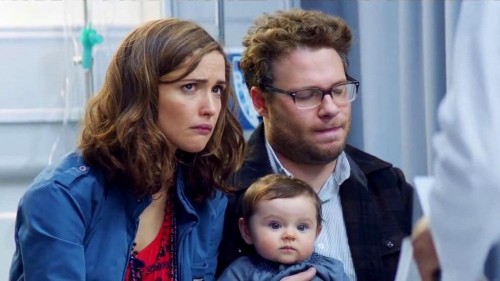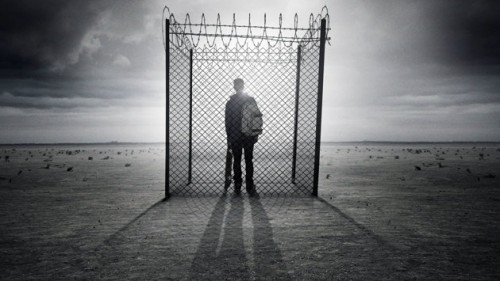By Greg Popil
Over the past decade, both as a writer and actor, Seth Rogen has mined laughs out of the paralyzing fear that comes from the changes inherent in growing up. Beyond their nonstop barrage of jokes about bodily functions and drugs, “Superbad” dug into the anxieties of leaving high school and possibly your best friends behind, the excellent dramedy “50/50” examined the idea of facing a friend’s death for the first time, and “Knocked Up” with the realization that, once you have a baby, you are no longer the most important person in your own life. With his cherubic face and encyclopedic knowledge of pop culture and ways to consume and enjoy marijuana, Rogen could enjoy a comfortable career of playing easygoing stoners in endless variations on “Pineapple Express.” It is to his credit that he continues to examine the effects of the real world on that lifestyle.
The plot of “Neighbors” could function as a sequel to “Knocked Up:” Rogen and Rose Byrne play Mac and Kelly, loving parents of a new baby girl that work at well-paying, utterly boring jobs which help them to pay for their beautiful suburban house. Their easy but frustratingly complacent lives are thrown into upheaval by the arrival of a fraternity in the neighboring house, led by Zac Efron and Dave Franco.
The comedic escalation that ensues is nothing new, but the route to the inevitable inter-neighborhood war is unique: Mac and Kelly, who just a few nights before were desperately trying to reconcile how to bring their baby to a rave without eventually facing criminal charges, befriend the frat and embark on an epic bender with them so that the brothers won’t think of them as, horror of horrors, uncool. Rogen and Byrne are not the typical buttoned-down antagonists of these comedies, as they seem to genuinely like the frat brothers and want to be good neighbors. Conversely, the frat doesn’t want to be the neighbors from hell (they all agree that Mac and Kelly’s baby is adorable), it’s just that, well, they’re college kids, and college kids are impulsive idiots.
The portrayal of the new parents as affable stoners who can (within reason) enjoy a good party makes for an interesting inversion of the late, great Harold Ramis’ classic slobs-vs.-snobs formula: for once, it’s the party-animal kids that are the antagonists. But even they are not cut-and-dry villains: their desire to throw an epic blowout that will live up to their frat’s historic reputation is the stuff of classic college movies (and a not-so-subtle nod to the filmmakers’ hope that their movie will one day be mentioned in the same breath as classics like “Animal House” and “Back to School”) and Efron’s frat god is given some nice moments of vulnerability, guiding a scared pledge through a rough hazing and showing anxiety for his own post-collegiate life, in a nice parallel with his neighbors’ plight.
Director Nicholas Stoller has helmed this kind of emotionally charged comedy before (has any ostensibly funny movie featured more crying than “Forgetting Sarah Marshall?”), but in working with Rogen he has never done a movie this loose and improvisation-heavy, and that’s not always to the film’s benefit. As the conflict between the two houses escalates, Rogen might have benefitted from bringing a little more of the dangerous edge he displayed so wonderfully in “Observe and Report” to his performance. And the endless, Apatow-inspired riffing would have benefitted from some trimming. Improvisation and pop culture references should be used sparingly; a scene where two wasted guys bond over who was the best Batman at the end of a long night of partying is a great place to let actors cut loose and build their own dialogue, but a breakup scene between two key players doesn’t need a Kevin James reference. Similarly, pop culture references are fun, but need to be used as seasoning for the actual jokes, not always as the jokes themselves (though one Outkast-inspired bit is Hall of Fame-level awesome).
For all of “Neighbors’” male-on-male plot shenanigans, surprise MVP performance award goes to Byrne. Following her breakout performance in “Bridesmaids,” Byrne proves herself to be every bit the comedic force as Rogen. Her new mom Kelly happily, gloriously upends every female stereotype for this type of comedy: not once does she nag her husband to stop escalating the feud, nor does she play the sober straight man to Rogen’s hijinks. It is to Rogen’s immense credit that, although a much bigger star, he cedes equal footing to Byrne for every punchline and plot development (when was the last time a female got half of the best laughs in a Will Ferrell or Adam Sandler comedy? Even Christina Applegate’s awesome performance in “Anchorman” was as a clear sidekick). On top of that, the pair have a natural, unforced chemistry, the kind you wouldn’t mind seeing share the screen again. Maybe in a stoner comedy about the fear of moving into a nursing home together in 2054.
Rating: 63/81




Leave a Reply